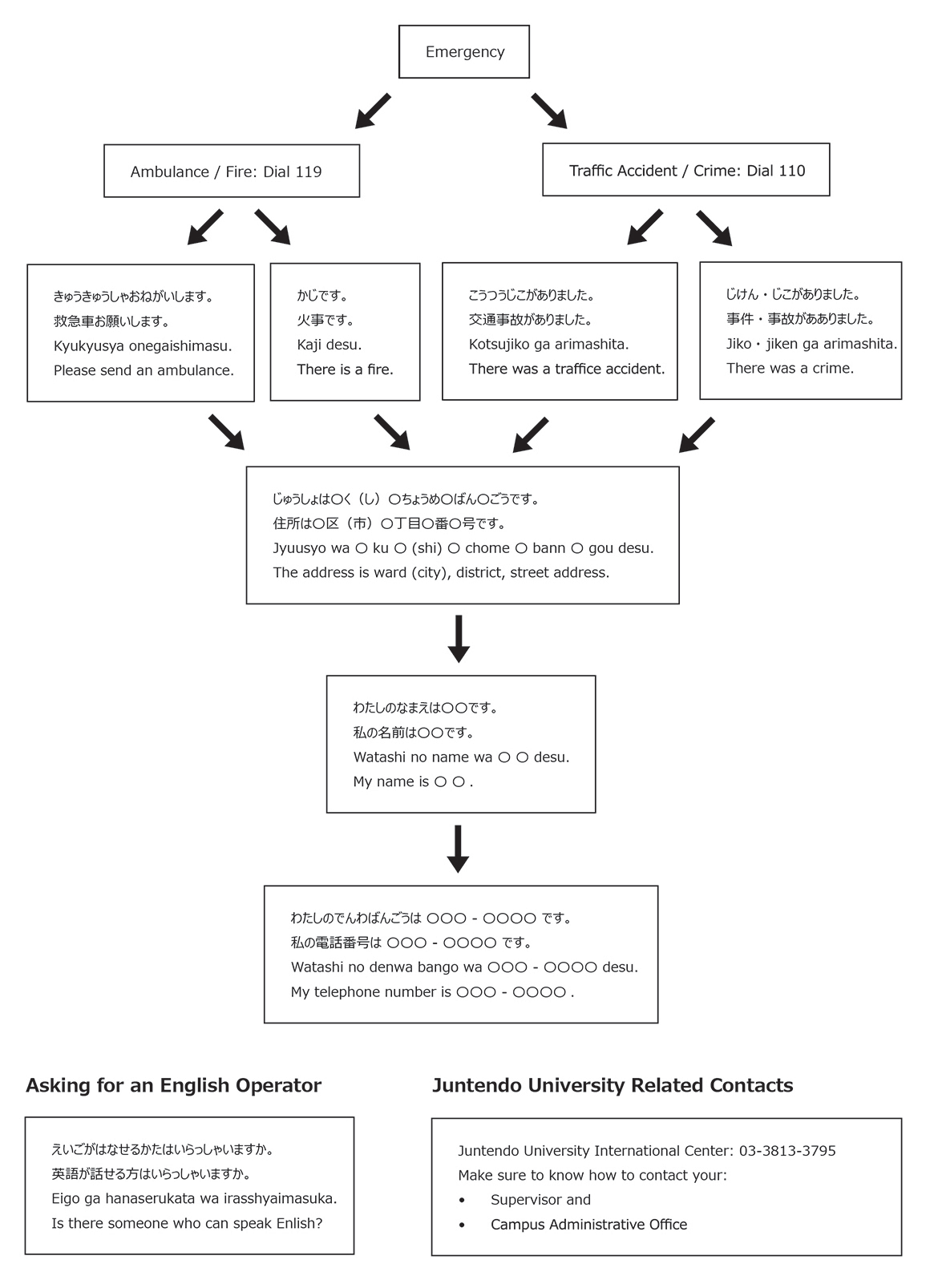
Earthquakes & Disaster Safety
- Tokyo Metropolitan Government - Disaster Preparation Manual
- Bunkyo-ku Municipal Office - Disasters Measures pamphlet
- NHK - Multilingual Emergency Updates
- Japan Meteorological Agency - weather, earthquake, tsunami, and volcano updates
- Japan National Tourism Organization - “Safety Tips“ app
- Many embassies provide travel alerts and warning notices to their citizens if they register their travel information with the embassy. Messages range from severe weather alerts to security notices.
Emergency Notification Procedures In Case of Emergencies
- Emergency phone lines are open 24 hours 7 days a week.
- All calls are free and may be made from public telephones.
- English speaking operators are available.
- People unaware of their address should provide the operator with near by landmarks.
- When describing what happened to the operator try and talk as calmly as possible.
- See the In Case of Emergency Figure for basic Japanese phrases that may be helpful in the case of an emergency.
Emergency Notification Procedures
- International students, researchers, and faculty involved with any of the emergencies listed in this section should contact Juntendo University International Center (JUIC, juic@juntendo.ac.jp, 03-3813-3795), their administrative office, and supervisor as soon as possible.
- JUIC will help resolve any issues that may be a result of the emergency.
AMBULANCE / FIRE: DIAL 119
- The 119 operator takes calls for both ambulances and fires, inform the operator from the start which you will need help with.
- For information about fire prevention refer to Tokyo Fire Department’s multilingual pages, languages include: English, Chinese, Korean, Thai, and Filipino.
Ambulance
- Dial 119 in the case of you need an ambulance for a sudden illness or severe injury.
- Inform the operator of the following:
- You need an ambulance
- What happened
- Where you will need services
- Your name
- Your phone number
- Have your residence card, passport, and health insurance card ready before the ambulance arrives.
- Someone should wait outside to help guide the ambulance to where the assistance is needed.
Fire
- Inform all of the people around you that there is a fire.
- Dial 119.
- Most fire department emergency operators have the ability to trace the callers destination, as long as the call is not made from a cell phone. If you do not know your address, stay on the line until the operator confirms your address.
- Inform the operator of the following:
- There is a fire
- What is on fire
- Where the fire is occurring
- Your name
- Your phone number
- Most fire departments have the ability to trace phone calls from land lines.
- In the case the you become engulfed by a fire cover your mouth with a wet towel to prevent smoke inhalation and crouch low while escaping.
TRAFFIC ACCIDENT / CRIME: DIAL 110
- The 110 operator takes calls for both traffic accidents and crimes.
Traffic Accident
- Dial 110 in the case of a traffic accident. No matter what the severity of the traffic accident may be.
- Inform the operator of the following:
- What happened
- Where you are, including any landmarks
- Your name and phone number
- Dial 119 in the case you experienced any injuries.
- Make sure that both you and the party involved in the accident wait until the police arrive before resolving the issue and leaving the site of the accident.
- Wait until the police arrive to exchange information.
- The police will issue a traffic accident certificate (kotsujiko-shomeisho, 交通事故証明書), which you may need for insurance purposes.
- If you need to go to the hospital following the accident be sure to receive a medical certificate (shindan-sho, 診断書).
Crime
- If you have been affected by a crime and need urgent assistance dial 110.
- Inform the operator of the following:
- What happened
- Where the crime occurred
- Your name and phone number
- In the case that your wallet was stolen, make sure to contact your bank and cancel any credit cards that you may have had in the wallet.
Figure: In Case of an Emergency
